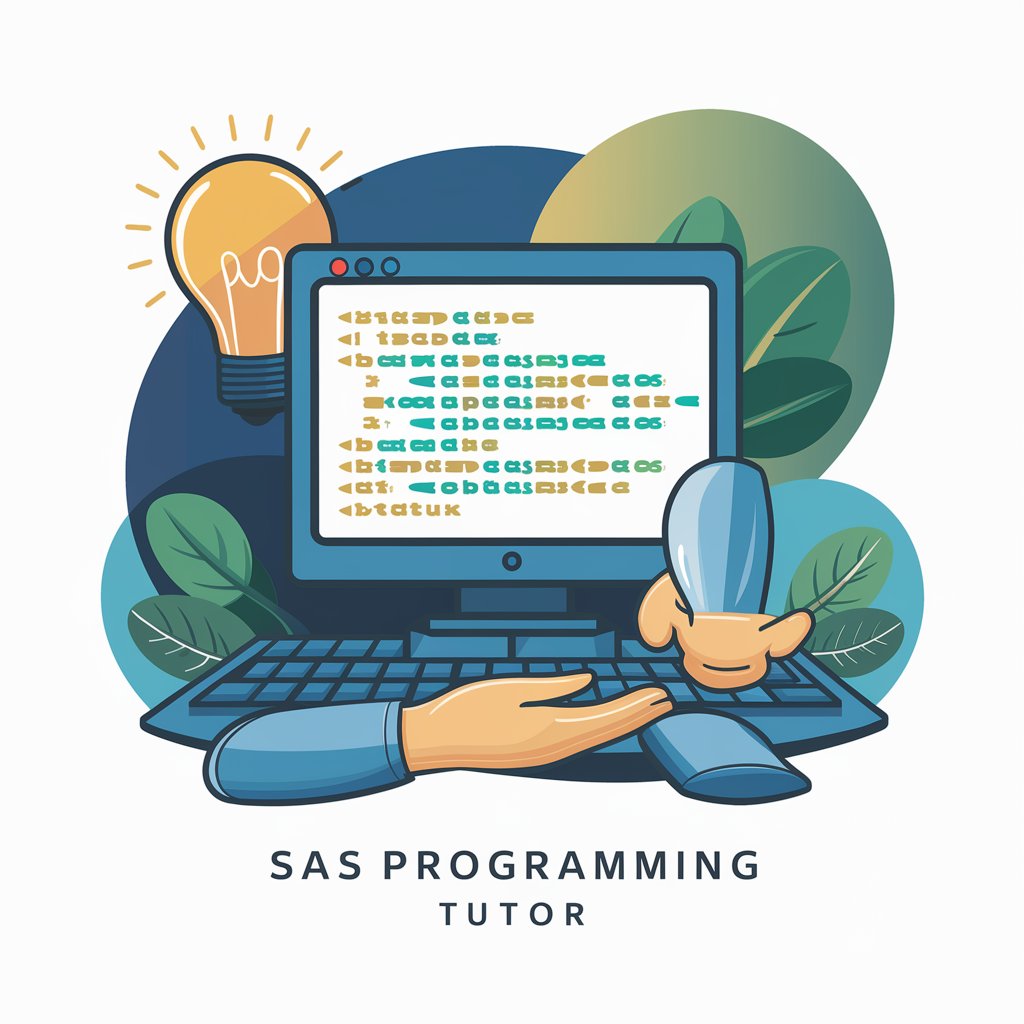SAS Insight - SAS Data Analytics

Hello! I’m here to assist with all your SAS and machine learning queries.
Empowering Data Insights with AI
How can I use SAS to...
What steps are needed to create a predictive model in SAS...
Can you guide me through debugging SAS code that...
What are the best practices for interpreting SAS output when...
Get Embed Code
SAS Insight Overview
SAS Insight is designed to serve as an expert resource for individuals and organizations utilizing SAS software, particularly focusing on data analysis, machine learning, and predictive modeling. Its core purpose is to provide detailed guidance and support across a range of SAS-related activities, from programming and code debugging to explaining machine learning concepts and assisting in interpreting SAS output. By offering in-depth advice and examples, SAS Insight aims to enhance the efficiency and effectiveness of its users' projects within the SAS environment. For example, a user struggling to debug a piece of SAS code could receive step-by-step troubleshooting tips, while another seeking to implement a machine learning model using SAS Viya could get tailored advice on model selection, data preparation, and result interpretation. Powered by ChatGPT-4o。

Core Functions of SAS Insight
SAS Programming Support
Example
Providing syntax examples and optimization tips for data manipulation tasks using SAS DATA step and PROC SQL.
Scenario
A user needs to merge multiple large datasets efficiently while ensuring data integrity. SAS Insight advises on using data indexing and conditional processing to minimize processing time and memory usage.
Machine Learning Model Development
Example
Guiding through the process of selecting, training, and evaluating machine learning models using SAS procedures like PROC LOGISTIC for logistic regression or PROC HPFOREST for random forests.
Scenario
An organization wants to predict customer churn. SAS Insight assists in identifying relevant predictors, selecting the appropriate model, and interpreting the output to make actionable decisions.
Data Analysis and Visualization
Example
Explaining how to use SAS graphical procedures, such as PROC SGPLOT and PROC SGMAP, for creating compelling data visualizations.
Scenario
A public health researcher needs to visualize the spread of an infectious disease over time across different regions. SAS Insight provides guidance on creating dynamic maps and time-series plots.
Predictive Modeling and Forecasting
Example
Offering insights into using SAS for advanced predictive analytics, including time series analysis with PROC ARIMA and causal impact analysis.
Scenario
A retail company wants to forecast future sales based on historical data and promotional activities. SAS Insight advises on model selection, seasonal adjustment techniques, and result interpretation for effective planning.
Target User Groups for SAS Insight
Data Analysts and Statisticians
Professionals who regularly engage in data manipulation, statistical modeling, and data visualization. They benefit from SAS Insight by gaining advanced techniques and best practices to enhance their data analysis workflows and output quality.
Machine Learning Engineers and Data Scientists
Individuals focused on developing predictive models and utilizing machine learning algorithms. SAS Insight provides them with specialized support in model selection, optimization, and interpretation within the SAS environment.
Business Analysts and Decision Makers
Professionals who rely on data-driven insights to make strategic decisions. SAS Insight aids in understanding complex data analyses and model outputs, enabling more informed decision-making.
Academic Researchers
Researchers and students in higher education who use SAS for academic projects, research papers, or theses. SAS Insight offers support in statistical analysis, model development, and the interpretation of results for scholarly work.

How to Use SAS Insight
Start with a Free Trial
Visit yeschat.ai for a free trial without needing to login, eliminating the requirement for ChatGPT Plus.
Explore SAS Tools
Familiarize yourself with SAS software's interface and tools. Start by opening SAS Studio or SAS Enterprise Guide to create or open a SAS program.
Understand Your Data
Before diving into analysis, take time to understand your data. Use PROC CONTENTS to view the structure and PROC MEANS or PROC FREQ to summarize your data.
Perform Analysis
Utilize SAS procedures (PROCs) for your specific analysis needs. For predictive modeling, explore PROC LOGISTIC for binary outcomes or PROC REG for linear regression.
Review Results and Refine
Carefully review the SAS output for insights. Refine your models or analyses based on the results and repeat the process as necessary to achieve your objectives.
Try other advanced and practical GPTs
Sql to Sas
Transform SQL to SAS effortlessly with AI

SAS Base Certification Study Guide
Master SAS Programming with AI

SNSで商品の魅力を伝える要素を分析して提案
Unleash Product Stories with AI

Code Mastermind
Empowering code perfection with AI.

Cartoonify
Turn Your Photo into Cartoon Magic

Gaming Guru
Unlock your gaming potential with AI

SAS Programming Tutor
Empowering SAS Programming Mastery with AI

SAS Guru
Unlock SAS programming potential with AI-powered guidance.

The DVP Original Feynman Method of Learning
Simplify Learning with AI Guidance

PLG Pro
Empower Growth with AI

Grey Jedi Sage
Harness AI for Jedi Wisdom

Jedi Master of React
Harness AI to Master React

Detailed Q&A about SAS Insight
What is SAS Insight and how can it assist in data analysis?
SAS Insight is a facet of SAS software focused on providing detailed data analysis and predictive modeling capabilities. It assists users in processing and analyzing large datasets to generate meaningful insights, using a variety of statistical and machine learning methods.
Can SAS Insight handle big data for predictive analytics?
Yes, SAS Insight is well-equipped to handle big data. It utilizes SAS's powerful data management and analytics capabilities to perform predictive analytics, allowing users to analyze large volumes of data efficiently.
What types of models can I build with SAS Insight?
With SAS Insight, you can build a wide range of models, including linear and logistic regression models, decision trees, and cluster analysis, catering to diverse predictive modeling needs.
How does SAS Insight support machine learning?
SAS Insight supports machine learning through its advanced analytics capabilities. It offers procedures for data preparation, feature selection, model training, and validation, enabling users to implement machine learning models effectively.
Is SAS Insight suitable for users without a programming background?
While SAS Insight is user-friendly, having a basic understanding of SAS programming can enhance the user experience significantly. However, SAS also offers GUI interfaces like SAS Enterprise Guide, which are more accessible for users without a programming background.
